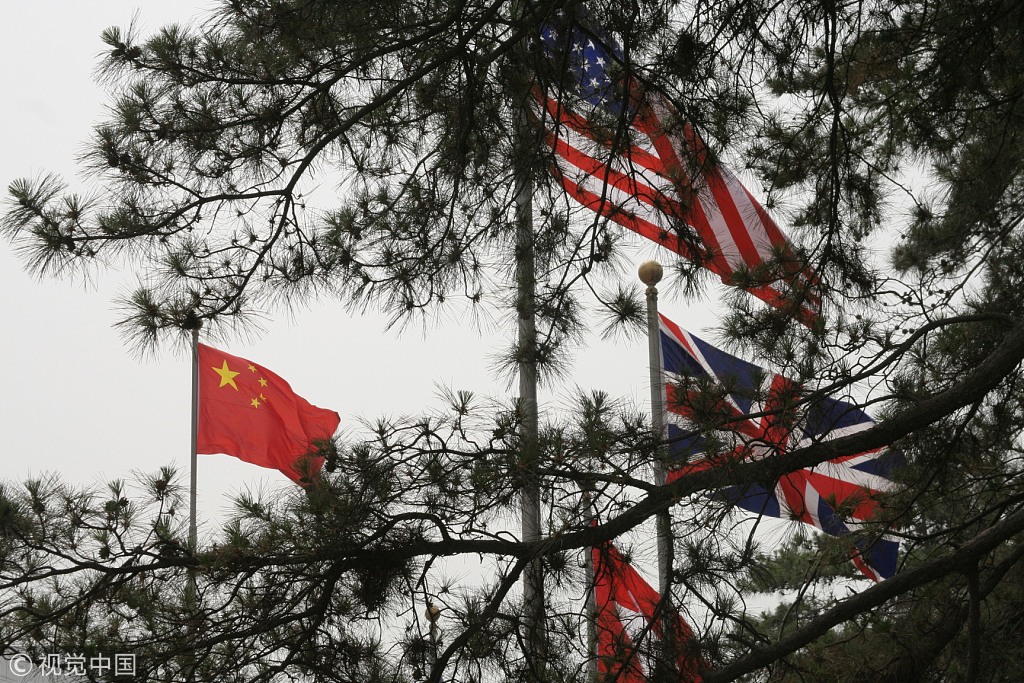Britain can stake out an independent line on the trade dispute that could help both Washington and Beijing
By David Marsh | chinadaily.com.cn | Updated: 2018-04-13 02:02

The UK, in the throes of departing from the European Union, will for fundamental political reasons not wish to get too far separated from both the US and Europe as it outlines its own policies for adjusting to the Sino-American trade dispute. Where London does however have some room for manoeuvre is on the policy front, where its advice may be valuable for both sides.
Britain will try to ensure that it does not get uncomfortably caught in the cross-fire of attrition. It has only limited means, and still less appetite, to try to help Beijing sidestep or circumscribe US-imposed trade restrictions. Despite the constraints, and depending on whether it gets caught up in separate anti-EU measures (and the EU’s own retaliation), the UK has an opportunity to steer a semi-independent policy line with China as Beijing tries to weather the fall-out.
One of President Trump’s critical aims is that China should strengthen intellectual property protection as a way to incentivise innovation. This will require learning from the experience of US and European companies operating in China – an area where the UK could play a central role.
A possible agenda for Britain as an “honest broker” between the two sides could end up both furthering the UK’s own interests in the macroeconomic as well as the corporate and university fields, as well as helping to support understanding between Beijing and Washington.
The US has announced on March 22 the imposition of tariffs of up to on $50 billion on Chinese exports to the United States while Trump again escalated trading tensions by ordering the US Trade Representative on April 5 to consider an additional $100 billion tariffs on China.
The Trump administration’s threatened tariffs are aimed at 10 sectors where China has pledged to seek world leadership in its landmark Made in China 2025 industrial policy. These include IT, power equipment, robotics, aerospace, energy saving, hightech vehicles, and medicine and medical devices.
These areas could be important sectors where Britain can bring influence. The UK can seek to persuade the US to show a measure of forbearance in preventing the discord from escalating into an all-out trade war. And it can argue for Beijing to adjust policies, particularly on foreign involvement in Chinese technology plans, to enable the country to maintain its strategic goal of becoming one of the world’s strongest and most prosperous nations by the middle of the century.
The menace for Beijing is that it may see its access scaled back to goods and services needed to fulfil its ambitious industrial policy objectives, where it depends a great deal on foreign technology companies. One of the most intriguing aspects of the trade quarrel is that the White House has started action at the World Trade Organisation against Chinese technology licensing practices and restrictions on investment in China.
The US argues that the moves are justified, while accusing China of purloining of US intellectual property. The UK can play a key role by itself promoting exchanges with China that encompasses adequate safeguards on protecting both sides’ intellectual property. Britain can lead the way in setting the agenda for Beijing in university and corporate deals that set viable future-orientated standards.
Britain can help Beijing to encourage equitable environment for young companies in technologically sectors.
The UK can bolster China’s efforts to create the right environment to improve the digital capacity and integration of domestic companies. This may require government initiatives to establish cross-country relationships to boost learning and innovation. Further liberalisation of cross-border trade and investment to facilitate technology diffusion is an important priority. All this could flow in a positive way from the Trump trade action – and Britain could be a catalyst promoting trade and investment measures that will help both China and the West in the longer run.
The author is chairman and co-founder of the Official Monetary and Financial Institutions Forum (OMFIF).
























